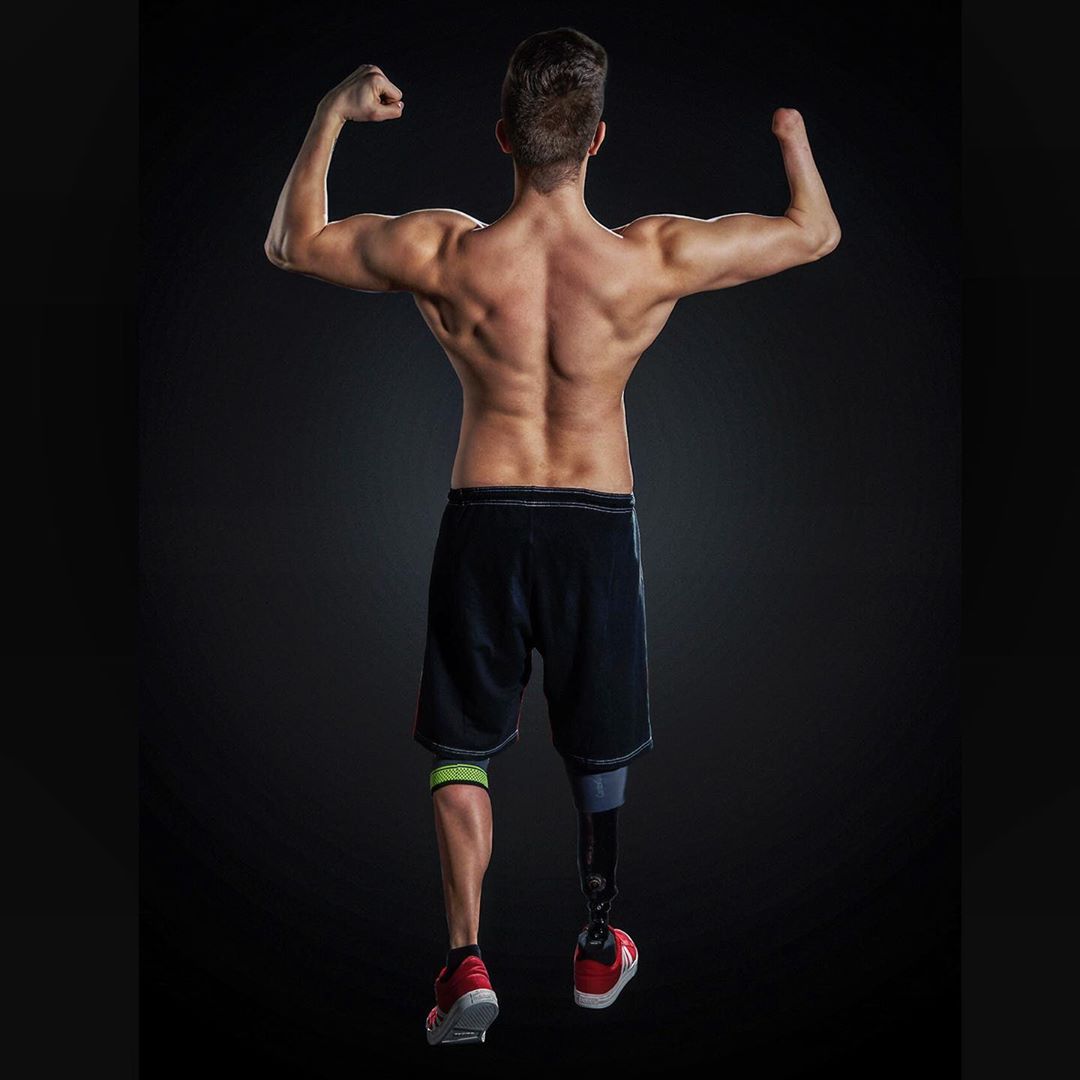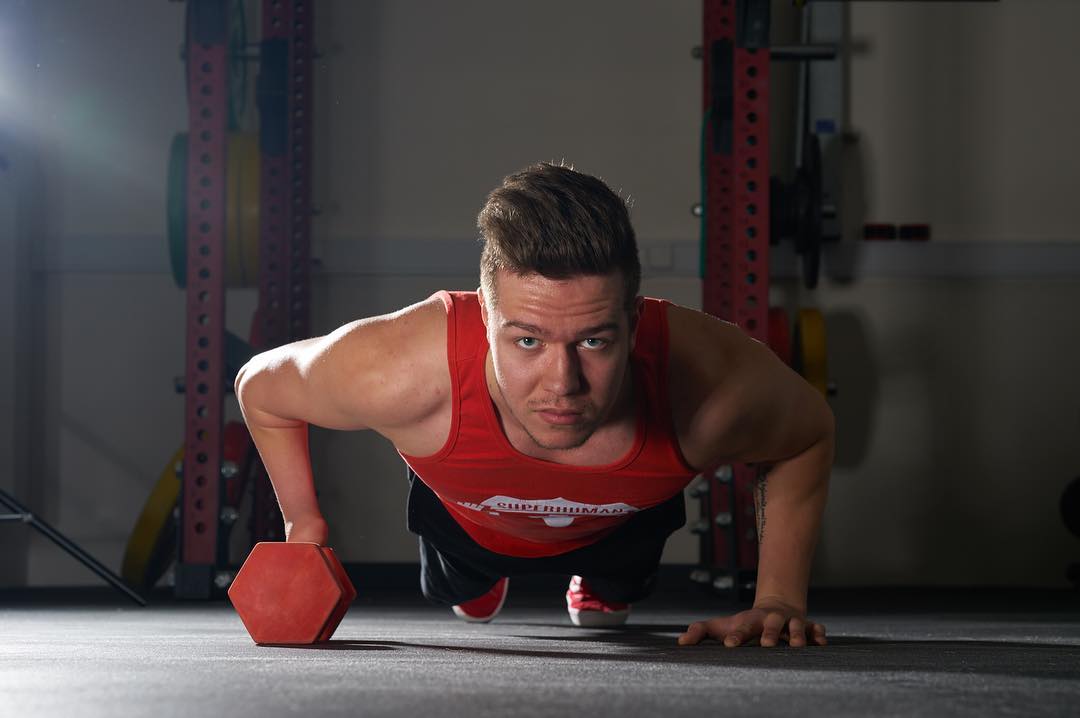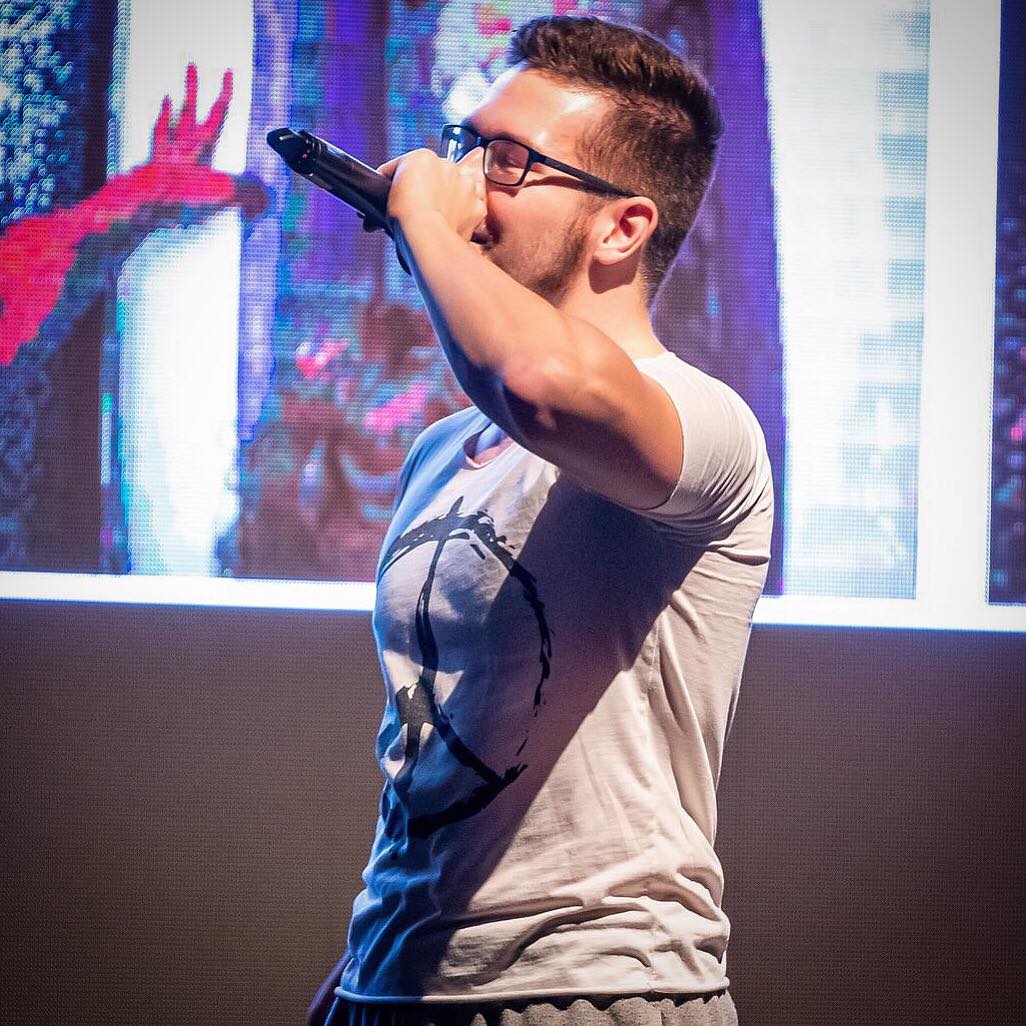Lukáš Polčák se narodil bez části nohy a ruky. Přesto plaval za paralympijskou reprezentaci a byl druhým nejlepším plavcem v Česku. Dnes se věnuje fitness, rappuje vlastní texty a snaží se motivovat ke sportu i ostatní lidi s nejrůznějšími handicapy. Mezi nejčastější dotazy, které dostává, přitom patří, jak zvládnout „pohledy okolí“. Sám si na základce zažil šikanu. Vždy však šel do všeho naplno.

Už od narození vám chybí jedna ruka a noha. Ono ale ve vašem případě nejde tak úplně říct, že „chybí“. Jdete do všeho naplno – sportujete a děláte hudbu. Navíc zpíváte i vlastní texty. Vzpomínáte si, jak jste se všemi aktivitami začal?
Vzpomínám si, že jsem chtěl vždy dělat vše, co mí vrstevníci, kamarádi. Proto jsem šel do všeho vždy naplno, ruka neruka, noha nenoha. J Motivaci a pozitivní přístup jsem se v životě učil a pořád se učím. Koukám na motivační filmy, čtu knížky o pozitivním myšlení, poslouchám motivační hudbu. Teď o víkendu jsem byl s přítelkyní v divadle na představení Čtyři dohody.
V jednom z vašich autorských textů zaznívá: „Bez ruky, bez nohy, ne beze snů, to bez pochyb.“ Bojoval jste někdy s pochybami?
Bojoval. A stále ještě občas bojuji, ale to je přirozené. Důležité je si vždy nakonec říct, že na to máte a nevzdat se. To je rozhodující fakt. Změnit způsob myšlení je velmi zdlouhavý proces a myslím si, že to nikdy úplně nejde. Za mě je důležité se naučit žít a fungovat se strachem, pochybami i obavami.
Jak jste se dostal ke sportu, nejprve šlo o plávání, dnes se věnujete fitness.
Když jsem byl mimino, doktorka rodičům doporučila, aby se mnou plavali. Jako prevence proti skolióze, lordóze a kyfóze, prostě špatnému držení těla. Měl jsem k tomu velké sklony. Takto jsem se dostal k plavání. Následně jsem začal plavat i závodně, jelikož mě to hodně bavilo, a hlavně mi to šlo! Byl jsem v plavání vážně dobrý. J Dva roky jsem závodil za paralympijskou reprezentaci a byl druhým nejlepším plavcem v Česku.
Později jsem plavání nechal, bylo mi asi tak osmnáct let. A kolem dvaceti jsem se začal věnovat cvičení. Nejdříve venku, potom i v posilovně. A to mi zůstalo dodnes.
A jak často trénujete?
Jak kdy. Teď přes léto méně, ale od září začínám trénovat třikrát až čtyřikrát týdně!

Co byste doporučil těm, kdo chce s cvičením začít?
Každý jednou začínal a stál tam také. I ti, kdo jsou dnes největší frajeři. Takže je to jen na vás. Prostě hlavně začněte.
V jednom z rozhovorů jste vzpomínal, že se na vás zpočátku dívali ostatní sportovci ve fitku jako na blázna. A také tak nějak „pečovatelsky“. Jsou nějaké další situace, kterým jste musel čelit?
Ano, opravdu tomu tak nějakou dobu bylo. Teď už je vše jinak.
Ten pečovatelský přístup je fajn jen do jisté míry. Já vždy říkám, že kdybych chtěl s něčím pomoct, tak si o to sám řeknu. A tak to má opravdu většina handicapovaných. To znamená, že se nemusíte desetkrát ptát, jestli opravdu nechceme s něčím pomoct, jen nás tím nazlobíte.
Snažíte se motivovat ke sportu i ostatní lidí s nejrůznějšími handicapy. Především skrze sociální sítě. Obracejí se na vás někteří z nich s prosbou o radu, jak například začít? Jaké problémy nejčastěji řeší?
Obracejí. Chodí mi často děkovné zprávy, že díky mým videím a tak začali cvičit nebo dělat běžné denní aktivity. Třeba nedávno mi psal dvacetiletý borec, že díky jednomu mému videu se konečně naučil zavazovat si tkaničky bez jedné ruky! Hustý že? To je pak opravdu krásný, když vidím, že to má smysl. Nejčastěji se ale lidé ptají na to, jak zvládat pohledy okolí. To je prostě nejčastější téma.
V práci pracujete na počítači. Jak zvládáte psaní, musel jste se to nějak speciálně učit?
Já popravdě už ani nevím, jak jsem se to naučil, byl jsem dítě. Ale dnes píšu „všemi šesti“. Na YouTube mám o tom, jak psát bez ruky, i video. Tak mrkněte!
Vraťme se tedy ještě do dětství. Vy jste se bez ruky a nohy narodil. Co pro vás bylo během školních let nejnáročnější? Po základní škole jste se vydal na studium gymnázia, a to sportovně zaměřeného.
Na základce jsem si zažil šikanu, ale i super kamarády, které mám dodnes. Měli jsme celkem fajn kolektiv, šikanovaly spíš starší děti. V pubertě jsem se naučil šikanu nevnímat a dnes jsem na tom tak, že mě nikdo nedokáže slovně nijak urazit. Život mě naučil se proti tomu obrnit. Na gymplu to bylo už v pohodě úplně, tam tohle opravdu už nikdo neřešil. Prostě jsem byl úplně stejný jako oni.
Letos budete pomáhat shánět dobrovolníky pro 9. ročník Letních evropských her handicapované mládeže Emil Open. Jak tuto událost vnímáte? Jedním z jejích cílů je právě přivádět handicapovanou mládež ke sportu.
Jsem za to velmi rád. Vnímám to jako skvělou událost, kdy se sejde spoustu nadějných sportovců napříč zeměmi, a hlavně i napříč různými handicapy. Lidé zjistí, že ať máte handicap takový, či jiný, můžete dělat váš oblíbený sport a být v něm úspěšní. A to je podle mě extrémně důležité. Moc se na celou akci těším a také na své hudební vystoupení. To bude hned první den při slavnostním zahájení.
Jaké máte nyní další sny a plány?
Děkuji za tuto otázku! Mám spoustu plánů a cílů, ať už v osobním, či kariérním životě. Chci se teď více věnovat hudbě, ale i natáčení motivačních videí pro lidi, protože vidím, že tohle je potřeba a lidem to pomáhá!
